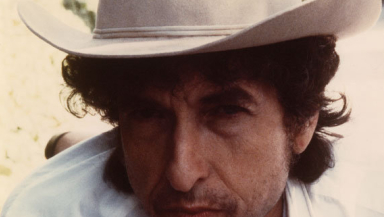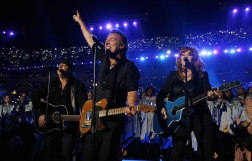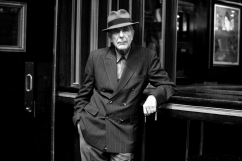
Bob Dylan has been awarded the Nobel Prize For Literature. The man born Robert Zimmerman has captivated audiences for over 50 years, first as an acoustic folk troubadour, then as electric iconoclast and now as an elder statesman of roots music.
The biting satire of his mid-'60s protest song 'With God On Our Side' was just one example of Dylan invoking themes of religious faith in his music. But it went from being a peripheral topic to his central concern, only to move out of focus again in his later years.
Dylan's career has seen him cover various themes. In the early and mid '60s, he was an anti-war activist, 1975's classic Blood on the Tracks is his frank look at divorce, while in the late '70s he recorded albums with explicitly Christian themes, which came after a period in which he had a 'born again' evangelical experience (though he later denied the 'born again' part).
Beginning with Slow Train Coming in 1979, Dylan released three albums of Christian material which saw him exploring his new-found faith as well as being pretty explicity evangelistic. The title track of the album contained lines which were as close to an altar call as pop music has ever come. "You gotta serve somebody," he sang, "It may be the devil, it may be the Lord, but you gotta serve somebody".
For someone who'd been at the heart of the '60s counter-culture, this was pretty extraordinary stuff. Remember, John Lennon, whom Dylan knew well had implied that the Beatles were bigger than Jesus. Lennon responded to Dylan's conversion in his own way – recording a song entitled 'Serve yourself'.
Dylan's Christian faith brought him close to believers such as former President Jimmy Carter who said, "Bob Dylan and I have been very close friends since I was governor. I first met him when he was going through an era of deep Christian faith."
Saved in 1980 and Shot Of Love in 1981 also contained plenty of Christian imagery. His Christian trilogy contains some of the sort of lyricism for which he's been awarded the Nobel Prize. Those albums weren't met with universal acclaim, though. Musically, Slow Train Coming is the best of the bunch, but there are lyrics on all three records that wouldn't be out of place in a revival meeting. "By His grace I have been touched, by His word I have been healed, by His hand I've been delivered, by His spirit I've been sealed," Dylan sang on the ttitle track of Saved.
By the time of Shot of Love, the tone was less evangelistic and more mystical – with Dylan channeling William Blake on 'Every Grain of Sand'. "Like Cain, I now behold this chain of events that I must break," he crooned. "In the fury of the moment I can see the master's hand, in every leaf that trembles, in every grain of sand."
Soon, Dylan's music became more secular again. The 1980s weren't especially kind to him creatively, but he roared back to prominence with a series of stunning late period records, starting with 1997's Time Out Of Mind. Dylan's music began to meld the folk of his youth with country, blues and gospel influences.
By the time of 2012's highly regarded Tempest Dylan was returning to themes of he'd mined many years before. On Narrow Way he sang, "It's a long road, it's a long and narrow way. If I can't work up to you, you'll surely have to work down to me someday."
These days it's hard to nail down where Bob Dylan sits on the faith spectrum. Having recorded an album of Christmas songs, he's also said to have returned to the Judaism of his youth. In interviews he still speaks of his belief in God at times.
What is clear is that the lyricism which moved a generation of teenagers into activism in the '60s hasn't died. His five-decade career has seen him inspire millions of people across the world – and despite no longer writing explicitly Christian music, some of his Christian-era songs still get performed at his shows.
There's been some shock at the accolade he's been given today, but maybe we shouldn't be surprised that a man steeped in the Judeo-Christian tradition, who reinterpreted it for the modern age, should have won the Nobel Prize for Literature.

















